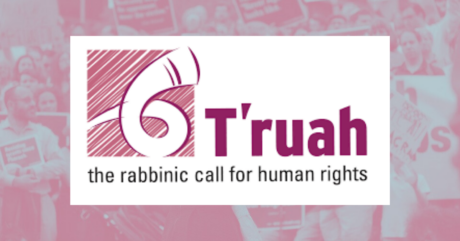NEW YORK – This week, U.S. District Judge Emmet G. Sullivan issued a decision ending Title 42, the dangerous policy that has been effectively shutting down the southern border of the U.S. to asylum seekers. T’ruah, a rabbinic human rights organization that represents over 2,300 rabbis and cantors and their communities in North America, welcomed the news and called on the government to reduce the number of people detained by ICE now that Title 42 will be lifted. T’ruah has issued continuous calls to end the harmful and immoral policy.
Rabbi Jill Jacobs, CEO of T’ruah, issued a statement following the ruling:
“Under the guise of protecting public health, Title 42 has put all people seeking asylum at our southern border at risk, including Ukrainians, Afghans, Venezuelans, Cubans, and others. This xenophobic policy has fueled chaos in our southern border region. From the very first day of Title 42’s implementation in 2020, public health experts have said it was not a useful tool to prevent the spread of COVID-19. Now that testing, treatments, and vaccines are widely available, it is even more clear that it is time for this policy to end.
“T’ruah asks that the U.S. government reduce — not increase — the number of people detained by ICE now that Title 42 is lifted. We also call on Congress, including incoming members and leadership, to recognize the fundamental human rights of asylum-seekers and oppose any legislation that bars access to asylum, including not legislating a renewed version of Title 42.
“Title 42 was the most restrictive asylum policy since Congress passed the Refugee Act in 1980. It did nothing to ‘manage the border’ as the Trump administration claimed, but rather stoked chaos and forced innocent asylum seekers to take desperate actions that even led to death in some cases.
“As Jews, we know that immigration policy can be a matter of life or death. Many of our own families fled danger to find refuge in the United States, and many of our family members died after this country’s borders were closed to them.
“Seeking asylum is a protected fundamental human right. Asylum seekers must be welcomed via a dignified, just, transparent, and timely system to gain legal entry into the United States. Our Jewish values demand nothing less.
“Although the change will not go into place for several weeks, we are relieved that asylum seekers will be granted their right to due process while seeking safety in our country. We hope for cooperation from all parties on a smooth transition after the ruling is officially instituted.”
T’ruah: The Rabbinic Call for Human Rights mobilizes a network of more than 2,300 rabbis and cantors from all streams of Judaism that, together with the Jewish community, act on the Jewish imperative to respect and advance the human rights of all people. Grounded in Torah and our Jewish historical experience and guided by the Universal Declaration of Human Rights, we call upon Jews to assert Jewish values by raising our voices and taking concrete steps to protect and expand human rights in North America, Israel, and the occupied Palestinian territories.

